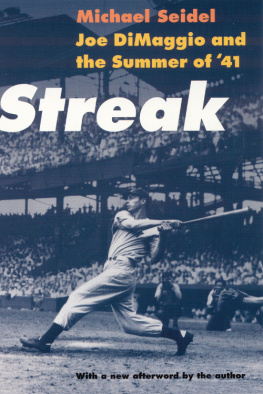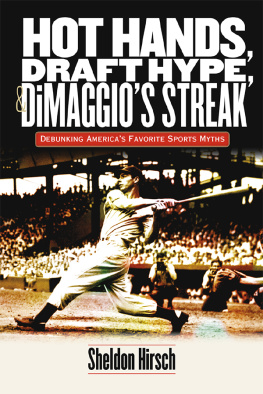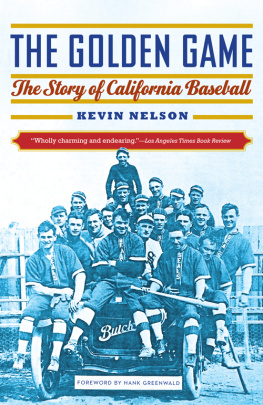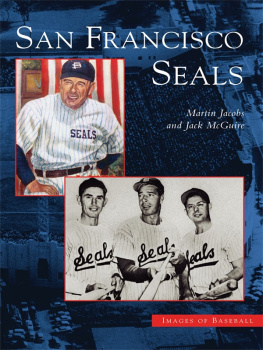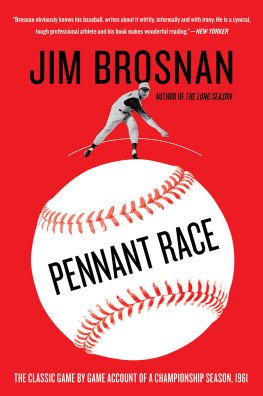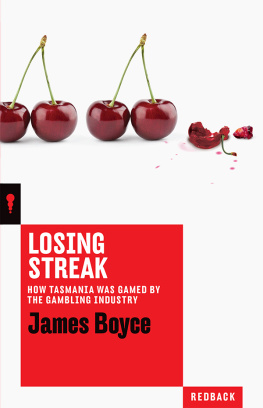
S TREAK
Joe DiMaggio and the Summer of 41
Michael Seidel
With a new afterword by the author
UNIVERSITY OF NEBRASKA PRESS
LINCOLN AND LONDON
1988 by Michael Seidel
Afterword 2002 by Michael Seidel
All rights reserved
Library of Congress Cataloging-in-Publication Data Seidel, Michael, 1943
Streak: Joe DiMaggio and the summer of 41/Michael Seidel; with a new afterword by the author.
p. cm.
Originally published: New York: McGraw-Hill, c1988.
ISBN 0-8032-9293-7 (pbk.: alk. paper)
ISBN-13: 978-0-8032-9293-2 (pbk.: alk. paper)
ISBN-13: 978-0-8032-9371-7 (electronic: e-pub)
ISBN-13: 978-0-8032-9372-4 (electronic: mobi)
1. DiMaggio, Joe, 191499 2. Baseball playersUnited StatesBiography. I. Title.
GV865.D5 S45 2002
796.357092dc21
[B]
2001052238
To the Memory of Jack Seidel
for whom Joe DiMaggio was as great a source of admiration and wonder as he has always been for me
Its amazing the hold he has on people after all these years. You would think a whole new generation of baseball fans had grown up who didnt know him, but they know him just as well as their fathers did.
Lefty Gomez
Contents
Preface
Great streaks in baseball are idealized versions of the game itself. They combine absolutes of concentration and duration; they exhibit on a continuous basis what one normally expects intermittently; their pace is glacial, and their crucial moments are lightning-quick. The very days of a streak generate all the captivating rhythms associated with baseball: its anticipatory potential, its tensions, its attenuations, its gratifications. And the individual effort required for a personal hitting streak is comparable to what heroic legend calls the aristeia, whereby great energies are gathered for a day, dispensed, and then regenerated for yet another day in an epic wonder of consistency.
No other sustained performance in the history of baseball builds with the drama and explodes with the energy of Joe DiMaggios 56-game consecutive hitting streak launched on a hazy Thursday afternoon in New York on May 15, 1941, and grounded on a damp summer night in Cleveland on July 17. Surely, none is more memorable. The following pages, in prose and pictures, focus on 56 baseball games and on the unforgettable days of a spring and summer in America. There are other books that chronicle the whole DiMaggio saga, including the private marital obsessions that have contributed to Joe DiMaggios place in the order of things through the 1950s and 1960s. I am not charting the biography of a man but the rhythms of a legendary sequence, perhaps the most admired sequence in sports history. To be legendary is to be worthy of written recordthat is what legendary means. My intent is to inscribe DiMaggios great streak in a context worthy of the memories it evokes.
In a recent film version of Raymond Chandlers Farewell, My Lovely, set in the spring and summer of 1941, Robert Mitchum, playing Philip Marlowe, follows the magical course of DiMaggios 56-game streak in counterpoint to his own experiences in the sleazy night world of murderers, frauds, freaks, hookers, and addicts. The daytime world of baseball, sunshine, and energy is antithetical to Marlowes misadventures and somehow restorative after them. But in a larger sense, even beyond Marlowes immediate comprehension, the tracking of DiMaggios streak in the movie is deeply nostalgic. Marlowe imagines through DiMaggios presence the heroic best of a land in its last summer glory before the wartime winter of its discontent.
DiMaggio began hitting during the spring thaw of Hitlers ruination machine in Europe, and he continued during a time of massive preparation in America for a war at once anticipated and dreaded. The days of the streak record the energies in a land preoccupied by war but as yet untested and unscarred by it. Early in 1941 America was excited by heroic prospects and frightened by bleak realities; fascinated by air power as a symbol of the frontier of modern adventure and horrified by the beginnings of saturation bombing in Europe; rallied by the concerted effort, especially in the media, to generate new reserves of heroic mythology and depressed by the Nazi threat casting an indecent pall over the western world; thrilled by the arming of democracy and spellbound by powerful isolationist voices such as that of the greatest American hero of all, Charles Lindbergh.
On the day DiMaggios streak began, headlines the world over bannered the bizarre solo flight and parachute jump of Rudolf Hess into Scotland a few days earlier. A few days later, in silence and in secret, a crack division of Hitlers paratroopers were poised on Athenian shores for an innovative and daring aerial attack on the oldest civilized island in the history of the world, Crete. Before DiMaggios streak was over the nation and the world would bear witness to the absorbing and climactic tracking of the huge German battleship Bismarck; the mysterious saga of the American merchant ship Robin Moor and the lifeboat odyssey of its passengers; the largest military campaign ever in world history, Hitlers monumental invasion of his nominal Russian ally along a 1,300-mile front on June 22, 1941; and the martial posturing in America culminating in midsummer with the hullabaloo over the first dispatch of American troops to a war zone, Iceland and its crucial Atlantic trade lanes.
Just three days after DiMaggios streak ended in July, a secret project in England reporting on new weapons concluded that the Allies had the capacity to produce the atomic bomb before Hitlers Germany. The British began work immediately, and so would America. That legacy of the war we have borne ever since. It is the cusplike quality of 1941, before any real recognition of the outrages then in embryothe total Holocaust in Europe and the dawn of the atomic agethat helps account for the nostalgic strength of the years appeal today.
The events, sagas, and personal histories crosscutting those fabled days include the names of some of the greatest statesmen and henchmen the world has ever known as well as the names of other men, women, and a few beasts still very much alive in memory if not in flesh: Roosevelt, Churchill, de Gaulle, Stalin, Hitler, Mussolini, Hess, and Ptain, along with Charles Lindbergh, Henry Ford, John D. Rockefeller, Ronald Reagan, Gary Cooper, Humphrey Bogart, Tallulah Bankhead, Hope and Crosby, Abbott and Costello, Gene Tierney, Orson Welles, Veronica Lake, Rita Hayworth, Nol Coward, George Bernard Shaw, Fritz Kreisler, Lillian Hellman, Ernest Hemingway, Harry Truman, Claude Pepper, Lyndon Johnson, Joe and Jack Kennedy, Fiorello La Guardia, Lou Gehrig, Joe Louis, Billy Conn, Max Schmeling, Sugar Ray Robinson, Craig Wood, Bobby Riggs, and Whirlaway.
What follows is a journal of DiMaggios streak and its games, of the players who played in them and remember them, of what actually occurred in them, of what made up the texture of life in America and in the world surrounding them. Baseball offered the land a good deal to remember in 1941: the drive of Ted Williams toward the .400 barrier, the approach of the immortal Lefty Grove toward his 300th victory, the Yankees team consecutive-game home-run record enfolded so neatly within DiMaggios own streak, the dramatic and scorching race between the Dodgers and the Cardinals for the National League pennant, and, finally, a moment of infamy in OctoberMickey Owens passed ball in the fourth game of the 41 World Series. But DiMaggios legendary 56-game streak will always remain the seasons crowning achievement.
Once the streak was picked up by the press and the fans in 1941, its daily rhythm became part of a national myth in a sport calling itself the national pastime. As an emblem of consistency under mounting pressure, the streak surely touched a responsive chord in prewar America and was recognized to have done so immediately by those excited enough to speculate about its significance. To tell the story of the streak is to tell many interweaving stories of the year, to enrich a legend with details that make its best moments truly epochal. These are famous games and cherished times, and the Streak Journal records them. While there are games within the sequence that shed familiar light on baseball recollections, there are also forgotten games that shed new light, clearing up some distortions that add little luster to a legend that shines more brightly without them.
Next page
